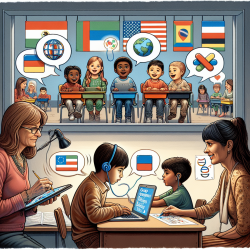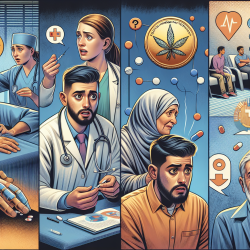Introduction
As practitioners in the field of speech language pathology, we continuously strive to improve the mental health outcomes of children under our care. The recent research article titled "Comparing Mediators and Moderators of Mental Health Outcomes from the Implementation of Group Problem Management Plus (PM+) among Venezuelan Refugees and Migrants and Colombian Returnees in Northern Colombia" provides valuable insights that can be leveraged to enhance our practices. This blog aims to distill key findings from this study and explore how they can be applied to improve outcomes for children.
Understanding the Research
The study investigated the effectiveness of Group Problem Management Plus (Group PM+), a task-sharing mental health intervention developed by the World Health Organization (WHO). This intervention was implemented among Venezuelan refugees, migrants, and Colombian returnees in Northern Colombia. The research focused on identifying mediators and moderators that influence mental health outcomes, providing a nuanced understanding of how and for whom the intervention is most effective.
Key Findings
Several critical insights emerged from the study:
- Moderators: The study found that participants in more stable, less marginalized positions showed the most improvement. This suggests that social determinants such as legal status, education level, and employment significantly influence the effectiveness of mental health interventions.
- Mediators: While Group PM+-related skill acquisition was not a significant mediator, qualitative data revealed that participants developed additional coping skills and strategies beyond the main four PM+ strategies assessed by the Reducing Tension Checklist (RTC).
- Contextual Factors: Factors such as community security, weather conditions, and transportation options also played a role in the effectiveness of the intervention.
Applying the Findings to Improve Child Outcomes
Based on these findings, here are several strategies practitioners can implement to enhance mental health outcomes for children:
1. Address Social Determinants of Health
Recognize the impact of social determinants on mental health outcomes. Tailor interventions to address the specific needs of children in more marginalized positions. For example, provide additional support for children from low-income families or those with unstable housing situations.
2. Develop Comprehensive Coping Strategies
Encourage the development of a wide range of coping skills beyond the primary intervention strategies. Incorporate activities that build confidence, improve communication skills, and enhance emotional regulation.
3. Consider Contextual Factors
Be mindful of the contextual factors that may influence the effectiveness of interventions. Ensure that sessions are accessible and consider factors such as transportation and weather conditions when planning interventions.
Encouraging Further Research
The study highlights the need for further research to explore additional mediators and moderators of mental health interventions. Practitioners are encouraged to engage in or support research efforts that aim to identify the most effective strategies for different populations. By contributing to the body of evidence, we can collectively improve the mental health outcomes of children globally.
Conclusion
The findings from the study on Group PM+ provide valuable insights that can be applied to enhance mental health outcomes for children. By addressing social determinants, developing comprehensive coping strategies, and considering contextual factors, practitioners can create more effective interventions. Additionally, ongoing research is essential to continue improving our understanding and implementation of mental health interventions.
To read the original research paper, please follow this link: Comparing Mediators and Moderators of Mental Health Outcomes from the Implementation of Group Problem Management Plus (PM+) among Venezuelan Refugees and Migrants and Colombian Returnees in Northern Colombia.










